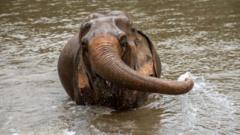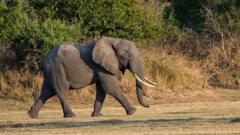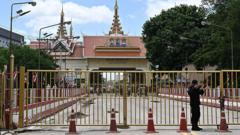A “panic-stricken” elephant tragically gored 22-year-old Blanca Ojanguren García, a Spanish law student, during a bathing session at the Koh Yao Elephant Care Centre in Thailand. The incident has sparked significant discussions on the ethical implications of elephant tourism, particularly the stress these animals endure in such environments.
Tragic Death of Tourist Highlights Ethical Concerns Surrounding Elephant Tourism in Thailand

Tragic Death of Tourist Highlights Ethical Concerns Surrounding Elephant Tourism in Thailand
A young Spanish woman lost her life while interacting with an elephant, raising alarms over tourism practices involving these majestic creatures.
García, who was studying in Taiwan and visiting Thailand with her boyfriend, was reportedly killed last Friday while washing the elephant, a practice commonly marketed to tourists. Local experts suggested the elephant’s distress was likely exacerbated by the unnatural conditions of tourist interactions, which are increasingly criticized by animal welfare activists.
Spanish authorities have confirmed that the country’s consulate in Bangkok is aiding García’s family during this difficult time. The Koh Yao Elephant Care Centre offers a range of experiences that allow tourists to shower, feed, and walk with elephants, with costs ranging from approximately $55 to $85.
The Department of National Parks indicates that Thailand is home to over 4,000 wild elephants and an equal number in captivity, often subjected to inadequate living conditions. Critics from organizations such as World Animal Protection have long condemned these practices, asserting that more than 60% of elephants used for tourism endure severe conditions. The charity emphasizes that elephants are highly intelligent and emotional beings, and their suffering in captivity is profound due to disrupted social structures.
While elephant bathing remains a popular attraction in Thailand, the deadly incident involving García serves as a stark reminder of the ongoing ethical dilemmas faced within the tourist industry concerning wildlife conservation and humane treatment. The call for reforms in how elephants are treated in tourism is growing louder, as more advocates push for an end to exploitative practices.
Spanish authorities have confirmed that the country’s consulate in Bangkok is aiding García’s family during this difficult time. The Koh Yao Elephant Care Centre offers a range of experiences that allow tourists to shower, feed, and walk with elephants, with costs ranging from approximately $55 to $85.
The Department of National Parks indicates that Thailand is home to over 4,000 wild elephants and an equal number in captivity, often subjected to inadequate living conditions. Critics from organizations such as World Animal Protection have long condemned these practices, asserting that more than 60% of elephants used for tourism endure severe conditions. The charity emphasizes that elephants are highly intelligent and emotional beings, and their suffering in captivity is profound due to disrupted social structures.
While elephant bathing remains a popular attraction in Thailand, the deadly incident involving García serves as a stark reminder of the ongoing ethical dilemmas faced within the tourist industry concerning wildlife conservation and humane treatment. The call for reforms in how elephants are treated in tourism is growing louder, as more advocates push for an end to exploitative practices.





















